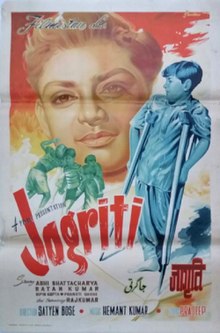Jagriti
| Jagriti | |
|---|---|
 | |
| Directed by | Satyen Bose |
| Written by | Satyen Bose Manoranjan Ghose Pandit Urmil |
| Produced by | Sashadhar Mukherjee |
| Starring | Abhi Bhattacharya Pranoti Ghosh Bipin Gupta Ratan Kumar Rajkumar Gupta Mumtaz Begum |
| Cinematography | N. V. Srinivas |
| Edited by | Shanker Hurde Vishwanath |
| Music by | Hemant Kumar Kavi Pradeep (lyrics) |
Production company | |
Release date | 1954 |
| Country | India |
| Language | Hindi |
Jagriti ("The Awakening") is a 1954 Bollywood film directed by Satyen Bose. It was based on the 1949 Bengali film Paribartan that Bose had also directed. The film stars Rajkumar Gupta, Abhi Bhattacharya, and Ratan Kumar in the lead roles. The film won the Filmfare Award for Best Film at the 3rd Filmfare Awards in 1956. Bhattacharya received the Filmfare Award for Best Supporting Actor for his performance in Jagriti at the same ceremony. Box office ranking # 6
The film was screened retrospectively on 14 August 2016 at the Independence Day Film Festival jointly presented by the Indian Directorate of Film Festivals and Ministry of Defense, commemorating the 70th Indian Independence Day.[1][2]
Plot
The film is about a spoiled rich kid, Ajay (Rajkumar Gupta), who is a problem child and is sent away to a boarding school by his uncle. The boarding school is run by Shekhar (Abhi Bhattacharya), who tries to instill good values in the students using unorthodox teaching methods. He gains the students' trust and educates them about the heritage of their country and encourages them to become model citizens.
At the boarding school, Ajay continues his ways and gets into trouble all the time, including with Shekhar. Meanwhile, Ajay meets and befriends a crippled boy named Shakti (Ratan Kumar) whose character is the opposite of Ajay's: dutiful and obedient. Shakti tries very hard to help Ajay change his ways, but Ajay's stubborn nature gets in the way.
Finally, one day, Ajay attempts to leave the school residence and Shakti finds out. Shakti tries to go after him and stop him, but his handicap slows him down and his earnestness to get Ajay back causes him to lose track of the heavy traffic on the road, causing him to be run over by a car and killed. This is a transformative moment for Ajay, who realizes that Shakti died because of his stubbornness. This moves him to change and become a better person. He goes on to excel in academics and sports.
Meanwhile, Shekhar's method of teaching wins approval by the education board. He decides to leave the boarding school to spread his message elsewhere through his unorthodox but successful ways.
Cast
- Abhi Bhattacharya as Shekhar
- Pranoti Ghosh
- Bipin Gupta
- Mumtaz Begum
- Rajkumar Gupta as Ajay
- Ratan Kumar as Shakti
- Chandan Kumar
- Dilip
- Raja
- Mohan
- Ghanshyam
- Navneet
- Girish
- Padmakar (as Padmaker)
- Nanda
Songs
This movie is known for its classic patriotic songs, written by one of the greatest Indian poets and lyricists of all time, Kavi Pradeep, and set to music by Hemant Kumar.
01. "Aao Bachhon Tumhen Dikhaaye" - Pradeep
02. "Chalo Chalen Ma" - Asha Bhosle
03. "De Di Hamein Aazadi" - Asha Bhosle
04. "Hum Laaye Hain Toofan Se Kashti Nikaal Ke" - Mohammed Rafi
05. "Chalo Chale Maa Sapano Ke Ganv Me" (Sad) - Asha Bhosle
Awards
- Filmfare Award for Best Movie
- National Film Awards
- 1954 - National Film Award for Best Feature Film in Hindi - Certificate of Merit[3]
Pakistani film Bedari
The Pakistani film Bedari had an identical plot and the songs, with replacement of some words, and music were taken directly from Jagriti. Ratan Kumar (Syed Nazir Ali),[4] who had moved to Pakistan with his family, acted in Bedari also.[5] When 'Bedari' was released in Pakistan in 1956, it too made fabulous business in the first few weeks of exhibition. However, it dawned upon the Pakistani cinemagoers that they were watching a plagiarized film. There was a mass uproar that caused public demonstrations against exhibition of the plagiarized film. The Censor Board of Pakistan immediately put a ban on this film.[6]
References
- ^ http://indianexpress.com/article/cities/pune/pune-a-film-festival-that-celebrates-freedom2962539/[permanent dead link]
- ^ http://dff.nic.in/70thIndependance_Day/70_Saal_Independance_Day.pdf
- ^ "2nd National Film Awards" (PDF). Directorate of Film Festivals. Retrieved 23 August 2011.
- ^ Nandini Chandra, Meerit and Opportunity in the Child-centric Nationalistic films of the 1950s, Narratives of Indian Cinema, Manju Jain, Primus Books, 2009, p. 123-144
- ^ Rattan Kumar Profile, Selected Filmography, 12 November 2011
- ^ https://www.dawn.com/news/1217564Paying plagiarised tribute to Quaid Sayed GB Shah Bokhari (Ex-Member Censor Board), on Dawn.com
